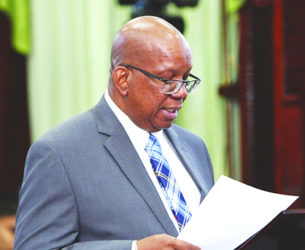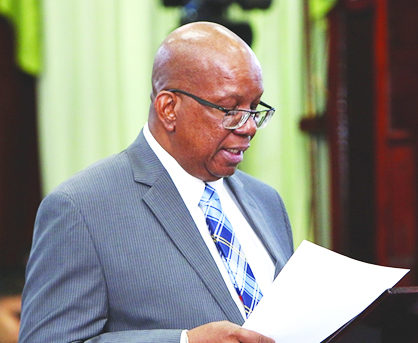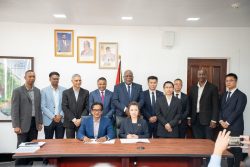Guyana’s first Money Laundering/Terrorist Financing National Risk Assessment has found that the accountancy profession carries a high risk for money laundering here.
This information was provided to the 35th Annual Caribbean Conference of Accountants by Minster of Finance Winston Jordan.
Speaking at the opening of the three-day conference yesterday, Jordan said that accountants can play an important role in helping Caribbean economies affected by the new regulatory measures imposed on international financial institutions by global standard setters such as the Financial Action Task Force.

He noted that these developments have resulted in correspondent banks in developed countries severing or reducing their relationships with jurisdictions that are considered high risk and explained that Caribbean governments have sought to reduce the impact of derisking by working assiduously to strengthen their country’s Anti Money Laundering and Countering the Financing of Terrorism (AML/CFT) regime.
“Accordingly, new laws and regulations that are imposed on many domestic institutions and the expansion of the regulatory perimeter will, most likely, create higher demand for accountancy services,” Jordan said before calling on the accountants to undertake appropriate Client Due Diligence.
“They are called upon to know who their clients are; what are their motives; and what is the nature of their businesses,” he stressed.
The Minister explained that Guyana has recently completed its first Money Laundering/Terrorist Financing National Risk Assessment, the findings of which will help policy makers to identify and assess money laundering and terrorist financing threats and vulnerabilities that are relevant to Guyana. This will then lead to efficiently channeling available resources to mitigate these risks.
He added that a key finding is that the accountancy profession carries a high risk for money laundering in Guyana and urged all accountants present to let their country’s anti money laundering laws take precedence over professional privileges so as to ensure that your offices do not facilitate predicate crimes.
Noting that modern technology has transformed the way accountants work and communicate with their clients, the accountants were also urged to adopt appropriate cyber security measures since like banking, trust remains vital in the relationship with clients to build adequate and secure defence mechanisms against cyberattacks.
Jordan also noted that the Forensic Audits conducted when the APNU+AFC government entered office in 2015 identified several shortcomings in the capacity of both the local accounting sector and the Auditor General’s Office.
He has therefore advised that the conference spend some time addressing this issue as well as seeking to position themselves to take advantage of the opportunities being created both in the public and private sector.
He stressed that professionals in this field due to the nature of their work are now being regarded as essential for a country’s growth and development
“The rate of growth in any country hinges on the efficiency with which available resources are managed and utilized,” the minister noted, stressing that “accounting is all about savings, which is at the heart of economic development and growth.”
Jordan took the time to explain that at the level of the Government, accountants hold the key to the efficient management of public funds, good governance, accountability and transparency.
He identified the Forensic Audits conducted by his government as an example of this function.
Fell far short
In 2015 the government commissioned dozens of forensic audits to investigate the state of the country’s finances. This decision was made after persistent and widespread allegations of corruption and unaccountable governance during the previous administration, however since there were few forensic accountants in Guyana the results of these audits “in several cases, fell far short of what one expected from a forensic audit.”
Despite these shortcomings the audits were able to reflect shortcomings in systemic and human capacity of the Auditor General’s Office.
According to Jordan, though he is unsure if these shortcomings are peculiar to Guyana or extend across the Caribbean, he hopes that the accountants will during their three-day meeting devote some attention to addressing this issue.
The Minister went on to identify several opportunities for accountants to be useful both to government and the private sector in the present economic environment.
He explained that ExxonMobil’s recent commitment of more than US$4 billion for the recovery of oil locally will see Guyana pursuing a path of economic diversification that is essential to avoiding the so-called “Dutch Disease” and “Resource Curse” that many oil producing countries have experienced.
“The efficient utilization and management of the revenue from this source and the changes that will arise in our tax and regulatory regimes will trigger an upsurge in the demand for the services of qualified accountants and allied fields,” the minister said.
He added that Guyana’s intention to expand core underdeveloped economic sectors; focus on value added products; and invest heavily in infrastructure and human development will occur at such a scale and magnitude that the skills of qualified accountants at the level of the government and the private sector will be required. As such this is an opportune time for Caribbean accountants to strategize on how to best position themselves to take advantage of the many opportunities that will be created not just locally but across CARICOM.
Additionally the region’s high exposure to climate change provides an opportunity for accountants versed on risk management to provide assistance to their clients in identifying their vulnerabilities to these changes and help them to build business resilience and competitiveness.
Jordan stressed that climate change poses severe risks to Small and Medium Enterprises in key sectors, such as tourism, agriculture and services which is especially important in Guyana as it can impact their contribution to the country’s Gross Domestic Product (GDP).










